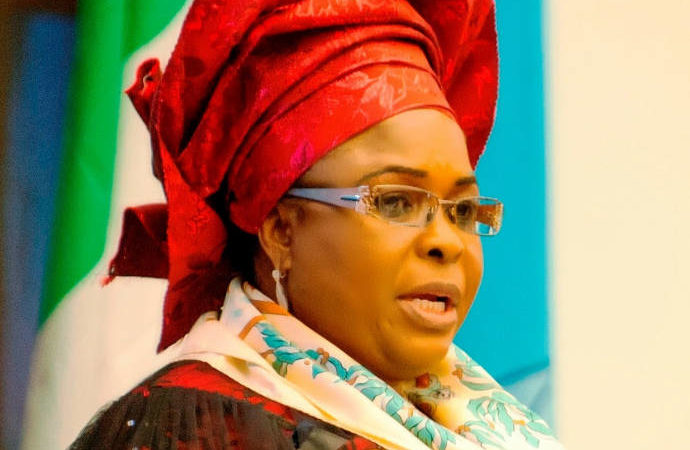- Court Unfreezes Patience Jonathan’s $5.9m Account
The Federal High Court in Lagos, on Thursday, vacated its order which late last year froze the Skye Bank account of Mrs. Patience Jonathan, the wife of ex-President Goodluck Jzonathan.
The account had a balance of $5.9m at the period.
In a ruling on Thursday, Justice Mojisola Olatoregun, set aside the ‘No-Debit Order’, which the Economic and Financial Crimes Commission had earlier placed on the account on allegations that the $5.9m found in it was proceeds of crime.
The judge upheld the contention of Patience’s lawyer, Mr. Ifedayo Adedipe (SAN), that his client’s account was unlawfully frozen by the EFCC.
Adedipe had urged the court to unfreeze Patience account on the grounds that she was not a party to the suit leading to the freezing order.
Citing judicial authorities, Adedipe contended that the suit was an abuse of court processes, contending that the court had no jurisdiction to make an order against someone who was not a party in a suit filed before the court.
The judge upheld the submission and therefore unfroze Patience’s account.
Justice Olatoregun said she had no option but to discharge the freezing order as the EFCC, despite being served with Patience application, did not file a counter-affidavit to oppose her prayers and all the averments contained in her affidavit.
She stated, “It is trite in law that an order cannot be made against any person who is not a party before the court.
“It was not controverted that Dame Patience Jonathan is not a party in the order obtained in this court.
“I hereby make an order unfreezing the Sky Bank account belonging to Dame Patience Jonathan forthwith,” the judge held.
Meanwhile, Adedipe also went before Justice Mohammed Idris of the same court, on Thursday, praying the judge to order the EFCC to release to Patience the sum of $15.591m, which was seized from four companies by the anti-graft agency.
Justice Idris adjourned to May 8, 2017 to decide whether or not to grant the prayer.
At the instance of the EFCC last year, Justice Olatoregun had made an interim order freezing multiple accounts linked to the former President’s wife.
The order was pursuant to an ex parte application by the anti-graft agency, wherein one of its operatives, Abdulahi Tukur, had told the judge that the funds retained in the said accounts were suspected proceeds of crime.
Tukur had told the judge that intelligence report by the anti-graft agency necessitated that the accounts be investigated, adding that it would be in the interest of justice that the accounts be frozen.
The accounts, opened in the names of companies and an individual, had a cumulative balance of N7,418,829,290.94 (N7.4bn) and $429,381.87.
Apart from Patience’s personal account, also affected are five companies, namely – Finchley Top Homes Limited, Aribawa Aruera, Magel Resort Limited, AM-PM Global Network Limited and Pansy Oil and Gas Limited.
Finchley Top Homes Limited’s account, number 1102001996 in Ecobank, with a balance of N226,376,700.23 and a fixed deposit of N1,099,511,484.88 was frozen.
Similarly affected were the company’s Skye Bank account number 1771731336, with a balance of N14,173,848.85; Fidelity Bank account number, 4011019539 with a balance of N1,800,494,000; Stanbic Bank account number, 0016901361, with a balance of N40,594,12.88; and Diamond Bank’s account 0019213687 with a balance of N39,418,712.12.
Aribawa Aruera Reachout Foundation opened account number 1222014221 with Ecobank and had a closing balance of N479,893,431.01, while Magel Resort Limited accounts (4011019546/5250059782) with Fidelity Bank had a subsisting balance of N1,000,494,000.
The company also operates a Zenith Bank account, number 1011744356, with a balance of N858,923,982, and a Diamond Bank account number 0024351590 with a balance of N174,166,207.00.
AM-PM Global Network Limited opened account number 0026718889 at Diamond Bank with a balance of N7,213,303.50.
The account number 4011019577, opened by Pansy Oil and Gas Limited at Fidelity Bank, had a balance of N1,809,666,494.68, while the company’s account in Diamond Bank had a balance of N55,930,024.50.
Also affected is one Esther Oba, with a balance of $429,381.87 in her account.


 Naira4 weeks ago
Naira4 weeks ago
 News4 weeks ago
News4 weeks ago
 Naira4 weeks ago
Naira4 weeks ago
 Travel3 weeks ago
Travel3 weeks ago
 Jobs4 weeks ago
Jobs4 weeks ago
 Naira3 weeks ago
Naira3 weeks ago
 Naira3 weeks ago
Naira3 weeks ago
 Investment4 weeks ago
Investment4 weeks ago





























